10,000 Classrooms In Iran Remain Without Teachers Amid Shortage
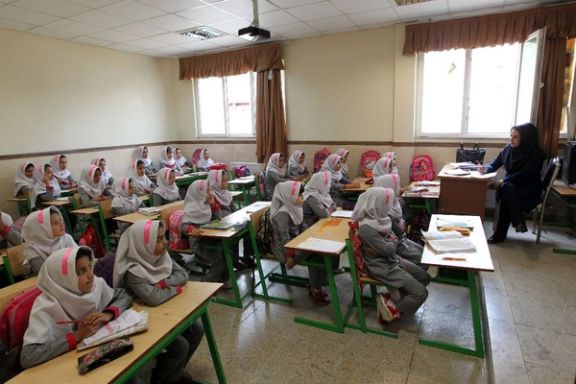
One month into the new school year, Iran is still facing a critical shortage of teachers while 10,000 classrooms remain without instructors.

One month into the new school year, Iran is still facing a critical shortage of teachers while 10,000 classrooms remain without instructors.
On Wednesday, the Fararu website conducted an in-depth examination of the alarming crisis, shedding light on the repeated inconsistencies in promises made by the education minister and the lack of a precise plan to address the ministry's issues under the leadership of Reza-Morad Sahraei.
According to recent statements from regime officials, there is a shortfall of around 250,000 to 300,000 teachers, affecting roughly 16 million students across all grade levels. In the province of Tehran alone, the shortage of teachers is estimated to be around 4,000.
Sistan and Baluchestan province, classified as one of the most underprivileged areas in terms of education, requires an urgent influx of 15,000 teachers.
Fararu has reported that the concerning statistics have prompted 30 members of parliament to sign a motion seeking the impeachment of Sahraei. However, the motion has yet to proceed to the implementation stage.
According to the report, the current issues plaguing education and training are partly attributed to the widespread retirement of teachers in previous years and the government's discontinuation of teacher recruitment efforts.

Iran’s ruler Ali Khamenei on Wednesday once again praised the militant group Hamas for its terror attack on Israel and said that Palestinians will ultimately win.
Speaking at a gathering in Tehran, the anti-Israel and anti-West leader of the Islamic Republic, also accused the United States of being a partner in what he called Israeli crimes.
With his usual rhetoric, Khamenei said, “The wounded and wrecked occupier regime seeks revenge for the blows dealt by the resilient Palestinian fighters in Gaza, but undoubtedly, despite all the support of the wicked oppressors and the explicit collusion of the Americans in the crimes of the Zionists, all this injustice and aggression ultimately leads to nowhere, and in these matters and future events, victory belongs to the Palestinian nation."
The Iranian regime immediately congratulated Hamas on October 7, as the news of the terror raid and the mass killing of civilians was being received. Later, the government organized street celebrations and began issuing statements of support for Hamas and threats against Israel and the United States.
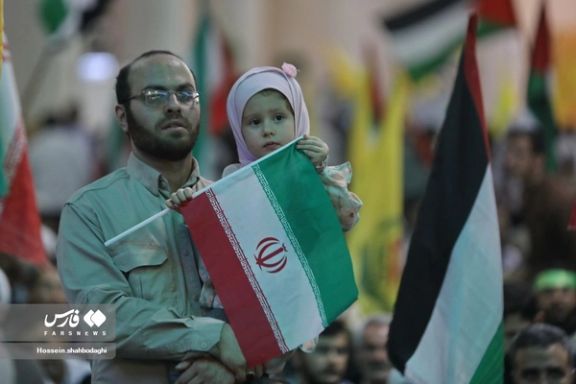
Khamenei on Wednesday described the attack on Israel as “defining and unprecedented.” He stated that with the passage of time, “the irreparability of this operation becomes more evident." He praised the “perseverance of the people of Gaza” and said that this will eventually “defeat the enemy.”
He claimed that leaders of “usurper and oppressor” governments are visiting Israel to save it from complete annihilation. "The evildoers around the world see that the Zionist regime is in a state of struggle and destruction due to the powerful and defining blow delivered by Palestinian fighters. For this reason, they are trying to forcibly keep the wounded and wreaked regime afloat through these visits, expressions of solidarity, and the provision of tools of crime such as bombs and other weaponry."
The 83-year-old Iranian dictator accused the United States of being a “partner in crime” with Israel. "The hands of the Americans are tainted with the blood of children, women, and other martyrs of Gaza, and in reality, the Americans are managing these crimes."
The Biden administration has warned Iran and Hezbollah not to get involved in the fighting and not to expand the war, although the militant Lebanese organization has already attacked some targets in Israel. The administration has deployed two powerful naval task forces in the eastern Mediterranean, which could be a deterrence against a potential barrage of missiles by Hezbollah.
Khamenei also called on Arab and Muslim governments to not lose their will in the face of “Western propaganda” and refrain from calling Palestinians terrorists.
Israel on Wednesday accused Iran of orchestrating recent attacks carried out by its proxies in Yemen, Iraq, and Lebanon in addition to supporting Hamas' war on Israel.
Israeli Chief Military Spokesperson Rear Admiral Daniel Hagari said: “Iran supported Hamas before the war directly, in training, in providing weapons, money and technological know-how. Even in these moments, Iranian support to Hamas continues with intelligence assistance alongside incitement on social media and fueling incitement worldwide against the State of Israel," he said.
Clearly naming Iran as the culprit of regional destabilization, he added; "In the Middle East where the Iranian proxies operate from within Iraq, Yemen and Lebanon, the instructions come from only one place — from Iran."
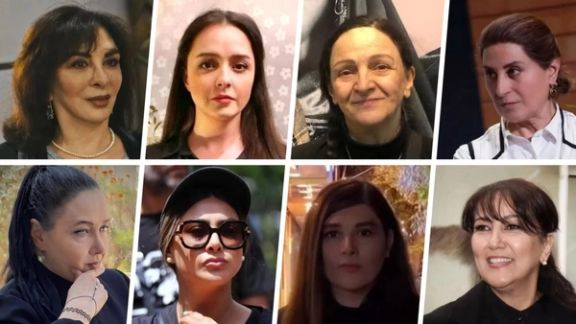
Iran has officially released a list of actresses who are now prohibited from working in the film industry due to refusal to wear the mandatory hijab.
The announcement follows months of uncertainty and conflicting statements from authorities associated with the culture ministry.
The director of the Supervision Department, Habib Ilbeigi, made the formal declaration on Tuesday, announcing that actresses who have defied hijab standards would no longer be allowed to participate in new film projects.
"Due to the constraints they confront, these actresses will no longer be able to pursue their careers in cinema. Nevertheless, their previous works will be gradually released to safeguard the interests of film producers, given the substantial investments made in these projects. However, they will be barred from participating in any forthcoming film productions," he said.
The list of affected actresses includes several well-known figures in the Iranian film industry, such as Baran Kosari, Vishka Asayesh, Taraneh Alidousti, Katayoun Riahi, Panteha Bahram, Hengameh Ghaziani, Pegah Ahangarani, and more.
In the wake of protests that erupted following the death of Mahsa Amini in custody last year, several female actresses have shown solidarity by sharing images of themselves without the obligatory hijab. Their acts of defiance have caused tensions with the Islamic Republic's state broadcaster, leading to the removal of them from TV sitcoms and movies in which they had previously appeared, or the discontinuation of the shows altogether.
Celebrities from the world of culture and entertainment as well as athletes, have come under huge pressure from the government since the uprising began last year, with punishments including pay cuts, bank account freezes and work bans. Some have even fled to exile after public displays of support for the Women, Life, Freedom movement on the world stage.
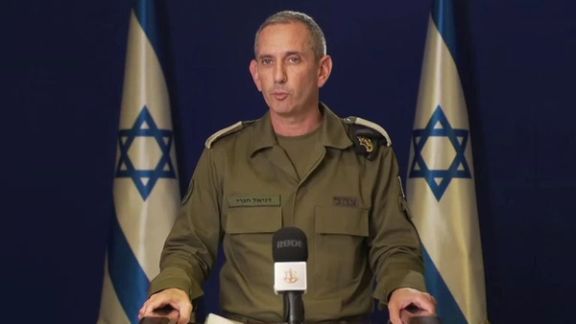
Israel has accused Iran of orchestrating recent attacks carried out by its proxies in Yemen, Iraq, and Lebanon in addition to supporting Hamas' war on Israel.
Israeli Chief Military Spokesperson Rear Admiral Daniel Hagari said: “Iran supported Hamas before the war directly, in training, in providing weapons, money and technological know-how. Even in these moments, Iranian support to Hamas continues with intelligence assistance alongside incitement on social media and fueling incitement worldwide against the State of Israel," he said.
Clearly naming Iran as the culprit of regional destabilization, he added; "In the Middle East where the Iranian proxies operate from within Iraq, Yemen and Lebanon, the instructions come from only one place — from Iran."
While Tehran continues to deny its hand in the war declared by Hamas on October 7, when thousands of Hamas militants stormed Israel by land, sea and air, massacring at least 1,400 and taking around 220 hostages, Hagari warned: "Whomever destabilizes the Middle East for the actions of the Hamas - ISIS criminals, cannot hide.“
Meanwhile, as Iran's biggest proxy, Hezbollah, continues to increase its attacks on northern Israel from Lebanon, the group announced that its leader in Lebanon, Sayyed Hassan Nasrallah, held discussions with top leaders of Palestinian militant factions Hamas and Islamic Jihad.
Hamas deputy chief Saleh al-Arouri and Islamic Jihad chief Ziad al-Nakhala met with Nasrallah as the proxies' alliance continues since Hamas declared war on Israel on October 7.
Iran is Hamas' biggest backer, giving over $100m a year in addition to weapons, technology, expertise, and training, which facilitates its attacks against Israel.
Since the war broke out, Yemen's Houthi militia has fired missiles towards Israel, intercepted by the US and Saudi Arabia. American forces in Iraq and Syria have come under attack from Iranian proxies 13 times in the last week. The US, one of the regime's archenemies alongside Israel, has vowed to support Israel in its war on terror group Hamas leading to a stepping up of Iran's regional militias.
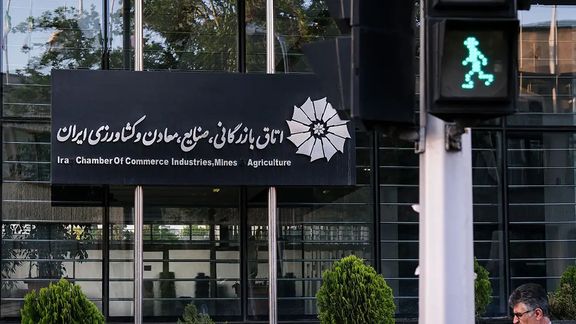
Conflicting reports about the removal of Iran’s Chamber of Commerce chairman indicate a push by hardliners to take control of the country’s private sector.
On Monday, state media reported that the head of the country’s Chamber of Commerce has been sacked after over four months of contentious relations with the hardliners in President Ebrahim Raisi’s administration, who rejoiced the development on social media. On Tuesday, the report was dismissed by the incumbent chairman himself, Hossein Salahvarzi, whose election in June was a manifestation of the growing divide between the hardliners and the businesspeople.
A large chunk of Iran's economy is controlled by the government and quasi-state foundations, where hardliners have a strong presence as managers with conflicting private interests.
The chamber is often referred to as the “private sector’s parliament” with over 400 members. The chairman's role is coordinating between the private sector and government and is sometimes required to participate in meetings with government officials. However, due to Salahvarzi’s critical views about the government's policies and performance, he was shunned by the administration and was never invited to any of meetings during the past four months, practically sidelining the private sector. The government also froze all its dealings with the chamber to force Salahvarzi out, and even published several fake news about his resignation during the past several months.
Although he won the election fair and square, obtaining 265 votes against 95 votes for Younes Zhaeleh, -- known to have close ties with the government -- the hardliners claim he was disqualified from running in the election by Iran’s Intelligence Ministry. However, the country’s judiciary approved the results of the election, and the parliament did not contest the results, and even the president himself only called for clarification on the issue.

Members of the chamber who are usually private businessmen have often criticized regime policies that have led to an economic crisis, including a confrontational foreign policy. The chambers often produce economic reports that the government finds embarrassing, or they criticize proposed budget bills and other plans.
The real development that occurred Monday was a session of a regulatory board of the chamber, which ended without any agreement, according to Salahvarzi’s post on X social media platform (formerly twitter).
Ali Shariati, a member of the chamber, described the media stunt about removal of Salahvarzi as “a coup against Minister of Industry, Mine, and Trade Abbas Aliabadi,” who holds the position since June. He claimed that the move was orchestrated by members of Iran’s ultra-hardliner Paydari (Steadfastness) Party, as a psychological operation to put pressure on Aliabadi, who does not belong to the group, but oversees the chamber. The party has its tentacles in all government institutions including the parliament where their members form a very influential minority that often takes a leading role amid the weak presence of established conservative and reformist parties. Shariati says the private sector will not allow the hardliners to engineer the elections and suppress the rule of law.
Hossein Marouf, another member of the chamber, told FarazDaily that chambers of commerce are advocacy organizations, explaining that the head of chambers should be part of the top-level government decision making and represent the private sector's demands. “When the government boycotts the chamber’s chairman and doesn't allow him to participate in meetings, there is no chance to effectively pursue demands.”
In the meantime, there is more bad economic news for the government. New reports indicate that the regime is not gaining revenues from its oil exports as much as it advertises, and its budget deficit will be twice as worse as that of the current year. The regime has reasons to muddy the data on its sanctions-hit income, but the parallel systems it has created during the years to circumvent international checks and balances have come back to bite its struggling economy.
Economist Mohammad Gholi Yousefi says Iran needs comprehensive economic reform to eliminate parallel institutions, allowing the private sector to have room for growth. He rejected the common belief that Iran’s economy will flourish if sanctions are removed, saying, “The problem is that we have a big government that intervenes in all affairs, disrupts the economic system, restricts the private sector, and even interferes in people's private lives. To achieve this significant change, amending the constitution is essential.”
Referring to another common belief that Iran’s accession to the Financial Action Task Force (FATF) will lift up the economy, he said, “So long as the constitution remains unamended and individual, social, and economic freedom are not seriously exercised, the lifting of sanctions and international agreements will not significantly contribute to the recovery of the economy.”

Hezbollah's leader met top counterparts from the Palestinian militant groups Hamas and Islamic Jihad to discuss what their alliance must do to "achieve a real victory for the resistance."
Part of Iran's regional network of proxy groups, the heavily armed Hezbollah has had daily exchanges of fire with Israeli forces along the Israeli-Lebanese frontier since war broke out between Israel and Hamas on October 7. However, Hezbollah has so far not opened a northern front against Israel, despite a heavy bombing campaign in Gaza against Hamas.
The meeting involved Hezbollah's Sayyed Hassan Nasrallah, Hamas deputy chief Saleh al-Arouri and Islamic Jihad chief Ziad al-Nakhala, Hezbollah said in a statement. It did not say when the meeting took place.
"An assessment was made of the international positions being taken and what the parties of the Axis of Resistance must do ... to realize a real victory for the resistance in Gaza and Palestinian and to halt the brutal aggression," Hezbollah said.
"There was agreement on continuing the coordination."
The United States, which has stationed two naval strike groups near Israeli and Lebanese waters, has warned Iran and Hezbollah not to expand the conflict.
Hezbollah announced on Wednesday that two more of its fighters had been killed, increasing the death toll in its ranks to 40 fighters since the start of the conflict.